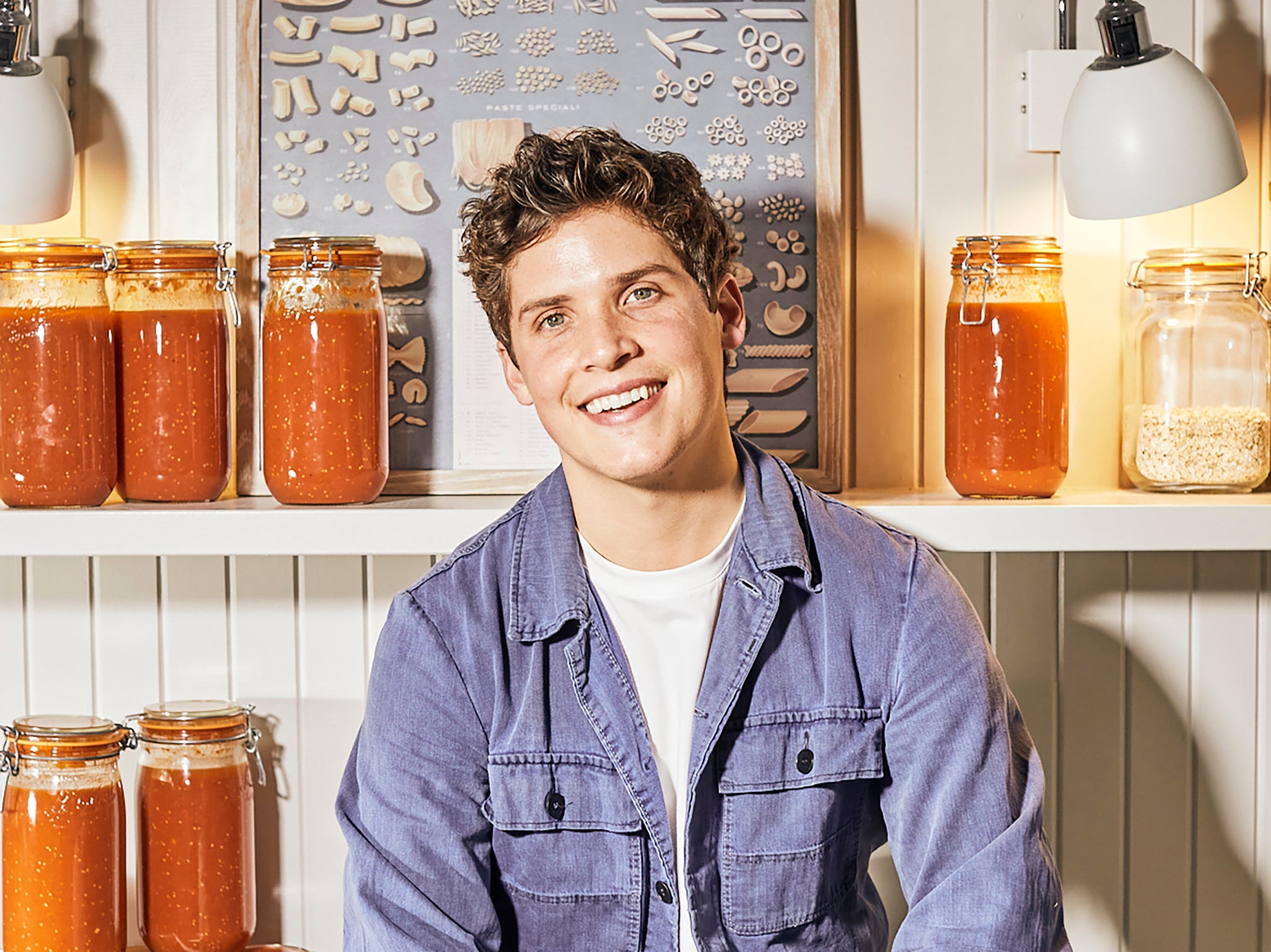Max La Manna: ‘Being totally zero-waste is impossible – it’s the small changes that count’
The whole-ingredient vegan cooking king speaks to Hannah Twiggs about his new book, how low-waste cooking can help during the cost of living crisis and why he prefers to live in the here and now


Your support helps us to tell the story
From reproductive rights to climate change to Big Tech, The Independent is on the ground when the story is developing. Whether it's investigating the financials of Elon Musk's pro-Trump PAC or producing our latest documentary, 'The A Word', which shines a light on the American women fighting for reproductive rights, we know how important it is to parse out the facts from the messaging.
At such a critical moment in US history, we need reporters on the ground. Your donation allows us to keep sending journalists to speak to both sides of the story.
The Independent is trusted by Americans across the entire political spectrum. And unlike many other quality news outlets, we choose not to lock Americans out of our reporting and analysis with paywalls. We believe quality journalism should be available to everyone, paid for by those who can afford it.
Your support makes all the difference.You wanna be zero-waste? Go live in a cave!” Over a gluten-free rhubarb cobbler on a sunny day in his studio in Peckham, the whole-ingredient vegan cooking king Max La Manna is discussing the rise, feasibility and burden of the zero-waste movement.
The 33-year-old American cook, now based in the UK, started making a name for himself in the space during the first lockdown, posting recipe videos encouraging people to try more plant-based food that utilises the whole ingredient, peels and all. It’s his approachability to the movement – and presumably his charisma and curls – that has seen him amass over a billion views across social media, appear on BBC Earth and Saturday Kitchen, and scoop a handful of awards including Most Sustainable Cookbook and Digital Creator of the Year.
“I want to say that zero-waste is impossible,” he says carefully. He prefers to think of himself as low-waste, especially in the kitchen, though he’s quick to also point out several thrifted items of clothing he’s wearing (he’s stopped buying secondhand underwear and socks because “that would be weird, wouldn’t it?”). “I think it’s really important for people to remember that the onus shouldn’t be placed on you to be completely perfect. We’ve all walked to work, ridden a bike, turned off the faucet when we’re brushing our teeth, hung up our clothes to dry,” and that’s enough.
Is he prepared to go live off-grid in a cave? “Umm, no,” he chuckles, then adds earnestly: “The emphasis should be placed on the top 100 companies that are producing 75 per cent of global greenhouse gas emissions. We should put pressure on them to make smarter, cleaner, healthier choices for us and the planet.” In the meantime, he says, “it’s really important for people to do the best they can and make the small changes”.
For La Manna, the easiest place to start is in the kitchen, cooking the food you already have. That’s the message of his new book, You Can Cook This, which is out now. The idea is simple by design. For two years, La Manna asked his social media followers to name the ingredients they were throwing away the most. More than 400 recipe videos, months of testing and a mammoth Excel spreadsheet later, he realised: “There’s a book here.” He compiled his findings into eight chapters, with a ninth advising what to do with the leftovers. Each of the eight is dedicated to an individual ingredient, featuring not just simple-to-follow, affordable recipes that utilise every part of the vegetable (time to get chummy with carrot tops and potato peels), but tips on how to clean, prep and store items to make them last longer, and meaningful use-by dates for the leftovers.
In this way, it functions as much as a cookbook as it does an instruction manual to experiment with a low-waste lifestyle, complete with detailed diagrams of what to store in which part of your fridge. “I kept coming back to: why are people throwing away food?” After months of research, he realised “people are simply not storing food properly, and that is making it go off quicker”.
Bagged leafy greens are one of the biggest offenders, he says, and he talks about them at length. “We’re busy, we’re running around, we have endless to-do lists, and we forget we have a bag of spinach in the fridge. There’s nothing more infuriating when you’ve spent the time, the money and the travel to get to the supermarket, buy ingredients and then they go off before we use them.” He recommends washing and soaking your salad in cold water “to bring it back to life”, dry it out and then divide it into portions. Put some in a container with a paper towel in the fridge and use within two to three days. Blanch the rest, squeeze out the moisture and freeze for future stir fries, stews, curries, soups and smoothies. “The freezer is such an incredible place to store food, but we don’t really use it properly.”
And if you must throw it away, consider composting, he adds. Not everyone can be persuaded to eat banana peels or apple cores. “If you’re lucky enough to have a compost at home [which La Manna does back in the West Country], toss it in with the soil,” he says. “There’s still nutrients in there and those nutrients go back into the soil, which feeds the soil, which then feeds us.” In cities like London, where La Manna is based for part of the week, the ability to compost is something of a postcode lottery. Even he had to fight his local council in Peckham for a green bin. When they initially said no, “I was like, no you don’t understand. This is my thing. I can’t not have one.”
While the environmental impact of reducing your food waste is a well beaten drum, it’s not lost on La Manna that his recipes have a place in the current economic climate, too. “It’s crazy how I was writing this two years ago and now we’re in this thing called the cost of living crisis,” he tells me. He throws his hands in the air, exasperated: “We’ve always been in a cost of living crisis!” When me and La Manna speak, London mayor Sadiq Khan had just unveiled his £130m scheme to ensure all primary school children receive free school meals for the next academic year. “Millions and millions of children are going to school every day, around the world and even here in [this] country, without food,” he says. “When we talk about the cost of living crisis now, we’re talking about it happening to people who are more affluent. The people who are affected the most have always been affected and continue to be affected.”
This isn’t unfamiliar territory for La Manna. One of the first times he can remember thinking about making ingredients go further was when he was living in New York, modelling and acting. He spent his days going to auditions and casting calls and his nights in restaurants, waiting tables, bartending or washing dishes. “After I’d paid rent, I only had a little money left to pay for food. I didn’t have help from my parents, family or friends, none of that. I was living in a basement and had a mattress on the floor, like I was…”. He pauses for a moment. “It was tough.” He started to teach himself how to cook. “I had a few spare ingredients lying around, and I ended up making a dish out of just three ingredients. I would use up everything I had until I could afford to buy the next meal. Sometimes dishes had just two ingredients in them.” Cooking in that way quickly became second nature.
After hosting some supper clubs around whole-ingredient cooking, La Manna was encouraged by his friends to join social media and, little by little, his following began to grow. When he noticed he had a bigger audience in the UK, he took a trip to London one summer to host some events, met his now wife – a slow fashion advocate – and never went back. Within six months, he was offered his first book deal.
You Can Cook This is a significant departure from 2019’s More Plants, Less Waste, which he describes as “quite out there”. In that book he explored more fringe areas of the movement, such as making “DIY deodorant” or dog biscuits out of the pulp left behind after carrot and orange juicing – something we might have tried in lockdown, but who has the time for that any more? Even he admits to moving away from the stringent rules he laid out back then. “It was really intense for me because I had a short period of time to develop recipes,” he recalls. “I just said yes without even thinking about the magnitude of what was happening.” I sense regret in his voice. He sees the new book as “Max 2.0”. Pointing to it, he says: “The cook in here is saying ‘cook me’. These dishes are incredible and they’re delicious. I’ve had them plenty of times and I still cook them now, which I think is a good sign. But I’m such a better cook now, oh my goodness!”
Social media stars are a dime a dozen these days, so it’s refreshing to see one resist the temptation to climb the slippery slope that comes with a quick rise to fame. When I tentatively ask if the haphazard speed with which the first book came about has made him put on the brakes after the second, he exclaims: “This is like therapy!” Happy to be of service, Max. “I think it’s really important to take your time. I learned the first time and I’m not making that mistake again. It’s important to me to make sure that whatever I produce and create and put out into the world is going to be informative, inspiring, educational. When people are like ‘I’m still making this recipe after two years’, it fills my heart with joy.”
For now, La Manna is living in the moment. “For my own mental health and wellbeing, I’m staying here in the present, enjoying the process,” he says with a cheeky smile. He then adds a more sombre aside, as he so often does: “Because we don’t know what’s going to happen tomorrow.” It’s a journey, he says, and this time it’s not a platitude. “If social media was to go away, I know I had this. This is going to outlive me. I love that.”



Join our commenting forum
Join thought-provoking conversations, follow other Independent readers and see their replies
Comments